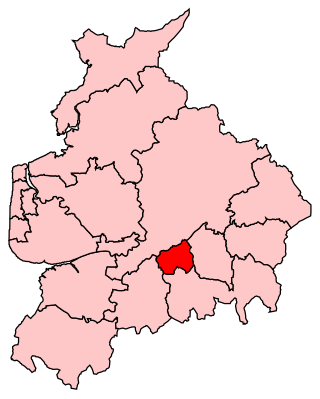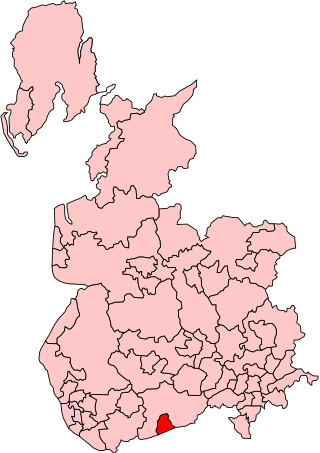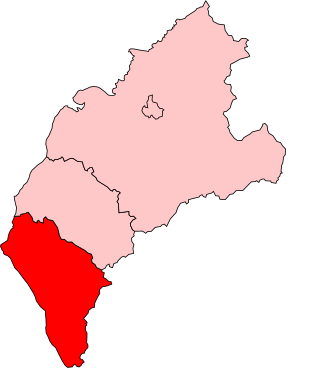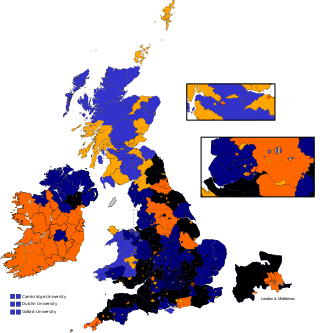
Hexham is a constituency in Northumberland represented in the House of Commons of the UK Parliament since 2010 by Guy Opperman, a Conservative. As with all constituencies, the constituency elects one Member of Parliament (MP) by the first past the post system of election at least every five years.

Blackburn is a constituency in Lancashire, England, which has been represented in the House of Commons of the UK Parliament since 2015 by Kate Hollern of the Labour Party. From 1979 to 2015, it was represented by Jack Straw who served under the Labour leaders of Neil Kinnock and John Smith and the Labour governments of Tony Blair and Gordon Brown.

Wansbeck is a constituency represented in the House of Commons of the UK Parliament since 2010 by Ian Lavery, a member of the Labour Party.

Blyth Valley, formerly known as Blyth, is a constituency represented in the House of Commons of the UK Parliament since 2019 by Ian Levy, a Conservative.

Berwick-upon-Tweed is a parliamentary constituency in Northumberland represented in the House of Commons of the UK Parliament since 2015 by Anne-Marie Trevelyan, a Conservative.

Lichfield is a constituency in Staffordshire represented in the House of Commons of the UK Parliament since its 1997 recreation by Michael Fabricant, a Conservative.

Stockton-on-Tees is a former borough constituency represented in the House of Commons of the Parliament of the United Kingdom. It elected one Member of Parliament (MP) by the first past the post system of election from 1868 to 1983.
Sunderland was a borough constituency of the House of Commons, created by the Reform Act 1832 for the 1832 general election. It elected two Members of Parliament (MPs) by the bloc vote system of election. It was split into the single-member seats of Sunderland North and Sunderland South for the 1950 general election.
The parliamentary borough of Finsbury was a constituency of the House of Commons of the UK Parliament from 1832 to 1885, and from 1918 to 1950. The constituency was first created in 1832 as one of seven two-seat "metropolis" parliamentary boroughs other than the two which already existed: Westminster and the City of London; the latter until 1885 retained an exceptional four seats. Finsbury was directly north of the City of London and was smaller than the Finsbury division of the Ossulstone hundred but took in land of Holborn division to its southwest in pre-introduction changes by Boundary Commissioners. It included Finsbury, Holborn, Moorfields, Clerkenwell, Islington, Stoke Newington and historic St Pancras. The 1918 constituency corresponded to the smaller Metropolitan Borough of Finsbury ; it was a seat, thus electing a single member, fulfilling a longstanding aim of Chartism which underscored the 1832 reforms.

Warrington was a parliamentary constituency in the United Kingdom. From 1832 to 1983 it returned one Member of Parliament (MP) to the House of Commons of the Parliament of the United Kingdom.

Whitehaven was a constituency centred on the town of Whitehaven in Cumberland, which returned one Member of Parliament (MP) to the House of Commons of the Parliament of the United Kingdom.
The Hartlepools was a borough constituency represented in the House of Commons of the UK Parliament. The constituency became Hartlepool in 1974. The seat's name reflected the representation of both old Hartlepool and West Hartlepool.
Hertford was the name of a parliamentary constituency in Hertfordshire, which elected Members of Parliament (MPs) from 1298 until 1974.
Bury was a borough constituency centred on the town of Bury in Lancashire. It returned one Member of Parliament (MP) to the House of Commons of the Parliament of the United Kingdom.

East Cornwall was a county constituency in the House of Commons of the Parliament of the United Kingdom. It elected two Members of Parliament (MPs) by the bloc vote system of election.

South Durham, formally the Southern Division of Durham and often referred to as Durham Southern, was a county constituency of the House of Commons of the Parliament of the United Kingdom. It elected two Members of Parliament (MPs) by the bloc vote system of election.

Tower Hamlets was a parliamentary borough (constituency) in Middlesex, England from 1832 to 1885. It elected two Members of Parliament (MPs) to the House of Commons of the Parliament of the United Kingdom. It was one of the first five of its type in the metropolitan area of London. It was enfranchised by the Reform Act 1832.

North Northumberland was a county constituency of the House of Commons of the Parliament of the United Kingdom. It was represented by two Members of Parliament (MPs), elected by the bloc vote system.
Stoke-upon-Trent was a parliamentary borough in Staffordshire, which elected two Members of Parliament (MPs) to the House of Commons from 1832 until 1885, and then one member from 1885 until 1918, when the borough was enlarged, renamed Stoke-on-Trent, and split into three single-member constituencies.
The county of Northumberland has returned four MPs to the UK Parliament since 1983. Under the Local Government Act 1972, which came into effect on 1 April 1974, the boundaries of the historic/administrative county were significantly altered with the south-east of the county, comprising more than half the electorate, being transferred to the new metropolitan county of Tyne and Wear. These changes were reflected in the following redistribution of parliamentary seats which did not come into effect until the 1983 general election, resulting in a reduction in the county's representation from 10 to 4 MPs.











